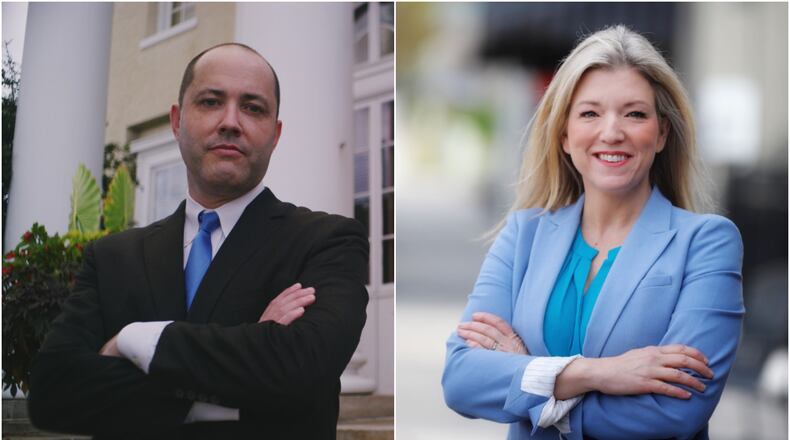When the U.S. Supreme Court overturned Roe v. Wade’s abortion protections, Georgia Attorney General Chris Carr submitted a letter to a federal appeals court asking the judges to allow a 2019 law restricting access to the procedure to take effect.
Soon after, state Sen. Jen Jordan, the Democrat who faces Carr in the November general election, said she would not spend taxpayer money to defend Georgia’s restrictive abortion law, which the court allowed to take effect in July.
The law bans most abortions once a doctor can detect fetal cardiac activity, typically about six weeks into a pregnancy and before many know they are pregnant.
The law is back in state court, where abortion providers are challenging it’s legality under the Georgia Constitution.
Carr has pilloried Jordan’s position, saying it is the role of the attorney general to defend state laws and not doing so is a “dereliction of duty.” Jordan said the attorney general is allowed to choose not to a defend a law if they think it violates the state constitution.
Legal experts say both approaches to serving as attorney general have merit.
Fred Smith, a constitutional law professor at the Emory University School of Law, referenced a 2003 lawsuit where then-Gov. Sonny Perdue, a Republican, sued Democratic Attorney General Thurbert Baker because the attorney refused to drop an appeal of the state’s legislative redistricting map.
The Georgia Supreme Court ruled that, as independent constitutional officers, both Baker and Perdue had the power to control the state government’s legal affairs and the governor couldn’t force the attorney general to act.
“The court said, constitutionally, they both have a role here, so they didn’t end up siding entirely with one side or the other,” Smith said. “There have been instances in states like North Carolina and California of attorneys general refusing to enforce laws that they believe to be unconstitutional. But where that standard should be is highly debated.”
According to the state constitution, the attorney general is tasked with being the legal adviser for the executive branch of state government, providing legal opinions, representing the state in court and prosecuting public corruption.
The attorney general mostly handles civil lawsuits, but in recent years, the Legislature has expanded the role to include investigation and prosecution under human trafficking and gang laws.
Carr, who declined to be interviewed for this article, has said Jordan’s position to refuse to defend certain state laws would make her an “activist attorney general.”
“My opponent has run her campaign promising to not do the job as outlined by our state constitution,” Carr said in a statement. “It’s the duty of the Georgia attorney general to defend the laws of the state, not to pick and choose which laws they like.”
Jordan said Georgia’s law violates the right to privacy guaranteed by the state constitution and, if she were attorney general when the law passed, she would have challenged the law in court.
“The attorney general we have in the office cares more about pushing his own partisan views and policies rather than protecting the constitutional rights of people in this state,” Jordan said. “He ran as quickly as he could to (the federal appeals court) to try to get this law to go into effect without thinking about the real-life consequences for women and girls.”
Martin Cowen, a Libertarian who is also challenging Carr, has said he wouldn’t go after violators either if elected.
Anthony Michael Kreis, a Georgia State University law professor specializing in constitutional law, said an attorney general is obligated to uphold and defend the state and U.S. constitutions.
“So if an attorney general believes a law that the General Assembly passed violates either the federal or state constitution, it is their obligation to not defend it,” Kreis said.
Sam Olens, a Republican who served as attorney general before Carr was appointed in 2016, said sometimes the role calls for the state’s top lawyer to defend laws you don’t agree with.
For example, while he personally disagreed with a constitutional amendment overwhelmingly approved by Georgia voters that established marriage as “only the union of man and woman,” it was his duty to defend challenges to the amendment.
“I feel strongly that, whether you personally like the law or dislike the law, if there is a strong legal argument in support of the law, you are bound under your oath to defend the law,” he said. “I never stated my official opinion on same-sex marriage because, of course, that would have ended up in the next (legal) brief. So there’s times you take a deep breath and do what’s right, which is uphold your oath of office.”
About the Author
Keep Reading
The Latest
Featured




